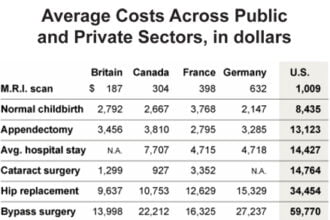In a rare bit of good news for the Obama administration and budget policymakers, health care costs increased last year at their slowest pace since the advent of Medicare and Medicaid in the mid 1960s.
In a rare bit of good news for the Obama administration and budget policymakers, health care costs increased last year at their slowest pace since the advent of Medicare and Medicaid in the mid 1960s.
The new analysis, released on July 25 by officials at the Centers for Medicare and Medicaid Services, the agency that administers the two programs, showed health care spending grew last year at a “historic” low 3.9 percent rate, which is slightly below 2009’s record-setting low of 4.0 percent. Health care spending as a share of the economy remained stuck at 17.6 percent, a welcome change from most years when it increases its share of total economic activity.
At a time when the White House and congressional leaders are worried about rampant long term growth of the government’s major health care insurance programs for seniors and the poor, the new data will allow government actuaries to project growth in Medicare and Medicaid over the next decade will be less than previously feared. This could potentially ease the task of the Obama administration and congressional leaders somewhat when they finally negotiate an agreement for slowing the growth of entitlement programs to help reduce the deficit.
Moreover, CMS actuaries are now saying the cost of insuring 30 million previously uninsured Americans under the president’s signature health care reform bill will add only a sliver to overall spending, and that increase is about half the projected growth rate of a year ago.
Looking ahead through 2020, CMS says health care spending will grow by 5.8 percent a year on average, which is about 1.1 percent faster than the rest of the economy. But only 0.1 percentage points of that growth will be due to the health care reform law. A year ago, CMS was projecting reform would raise health care spending an additional 0.2 percent a year.
Since nothing of substance has changed in the reform legislation, its lower projected cost is largely a byproduct of the overall reduction in health care spending, which health care economists said is being driven by a number of factors, including changes in consumers’ practices and more aggressive government oversight. “It’s too early to say that the Affordable Care Act will have a small effect on costs overall despite the coverage gains, but this is an optimistic sign,” said Alan Garber, an economist and physician at Stanford University.
Garber cited a number of factors beyond the recession that is lowering the average American’s propensity to consume fewer health care services. About one in seven privately insured Americans now belong to high co-pay, high-deductible plans, which force them to think twice about non-emergency care. “It makes people more aware,” Garber said. “It’s not play money. It’s your money. That may be having an effect.”
There have also been highly publicized crackdowns on Medicare fraud in areas of the country like Florida where costs and utilization rates are high. CMS is now projecting health spending on the elderly will only grow to $636 billion in 2014 from $525 billion in 2010.
That’s $35 billion less than what had been projected for 2014 a year ago. Moreover, CMS’s projection for Medicare spending in 2020 is $922 billion, whereas a year ago the actuaries were anticipating spending of $978 billion in 2019.
The actuaries cast cold water on the idea that delivery system reforms included in the new health care insurance legislation were driving the changes. “There is hope that research into innovative ways of delivering care will lead to slower growth,” said Richard Foster, CMS’s chief actuary, “but until those kinds of innovations have been designed and tested, we won’t have a sense of how large those savings will be.”
CMS’s projections for Medicare – last year or this year – do not include the so-called “doc fix.” Every year, Congress appropriates enough money to avoid a scheduled cut in pay for physicians who treat the elderly.
“If, as is far more likely, the 29.4 percent cut is avoided and the out-year cuts are eased, then spending levels and growth rates will increase significantly,” said Joseph Antos, a senior fellow at the American Enterprise Institute. “Under these more realistic assumptions, NHE [national health expenditures] will easily exceed 20 percent of GDP in 2020, and perhaps even earlier.” CMS currently projects health care spending will reach 19.8 percent of the Gross Domestic Product by 2020.
Antos also pointed out that there will be a one-time spike in health care spending in 2014 as the 30 million newly insured Americans purchase drugs and physician services that they previously did without, and those costs will become embedded in overall costs.
But Garber, who has chaired a Medicare advisory committee that makes coverage recommendations, said that could actually lower costs. “There’s new research that says Medicare Part D (the prescription drug benefit) by making drugs more affordable is lowering costs elsewhere in the system,” he said. Lowering blood pressure with affordable generic drugs is a lot cheaper than paying for treating heart attacks.
A growth rate that falls to just 1.1 percent faster than the rest of the economy grows has its own implications for the health care reform legislation, which created an Independent Payments Advisory Board to make recommendations for Medicare cuts whenever its growth exceeds GDP plus 1 percent. If the projections pan out, IPAB’s task will be much easier, and its recommendations to future Congresses and the elderly easier to swallow.
Republicans have charged the IPAB will lead to government rationing of health care, and have attacked the idea of the board, which hasn’t been appointed as of yet–a central talking point it their efforts to repeal reform.
In a rare bit of good news for the Obama administration and budget policymakers, health care costs increased last year at their slowest pace since the advent of Medicare and Medicaid in the mid 1960s.
The new analysis, released early Thursday by officials at the Centers for Medicare and Medicaid Services, the agency that administers the two programs, showed health care spending grew last year at a “historic” low 3.9 percent rate, which is slightly below 2009’s record-setting low of 4.0 percent. Health care spending as a share of the economy remained stuck at 17.6 percent, a welcome change from most years when it increases its share of total economic activity.
At a time when the White House and congressional leaders are worried about rampant long term growth of the government’s major health care insurance programs for seniors and the poor, the new data will allow government actuaries to project growth in Medicare and Medicaid over the next decade will be less than previously feared. This could potentially ease the task of the Obama administration and congressional leaders somewhat when they finally negotiate an agreement for slowing the growth of entitlement programs to help reduce the deficit.
Moreover, CMS actuaries are now saying the cost of insuring 30 million previously uninsured Americans under the president’s signature health care reform bill will add only a sliver to overall spending, and that increase is about half the projected growth rate of a year ago.
Looking ahead through 2020, CMS says health care spending will grow by 5.8 percent a year on average, which is about 1.1 percent faster than the rest of the economy. But only 0.1 percentage points of that growth will be due to the health care reform law. A year ago, CMS was projecting reform would raise health care spending an additional 0.2 percent a year.
Since nothing of substance has changed in the reform legislation, its lower projected cost is largely a byproduct of the overall reduction in health care spending, which health care economists said is being driven by a number of factors, including changes in consumers’ practices and more aggressive government oversight. “It’s too early to say that the Affordable Care Act will have a small effect on costs overall despite the coverage gains, but this is an optimistic sign,” said Alan Garber, an economist and physician at Stanford University.
Garber cited a number of factors beyond the recession that is lowering the average American’s propensity to consume fewer health care services. About one in seven privately insured Americans now belong to high co-pay, high-deductible plans, which force them to think twice about non-emergency care. “It makes people more aware,” Garber said. “It’s not play money. It’s your money. That may be having an effect.”
There have also been highly publicized crackdowns on Medicare fraud in areas of the country like Florida where costs and utilization rates are high. CMS is now projecting health spending on the elderly will only grow to $636 billion in 2014 from $525 billion in 2010.
That’s $35 billion less than what had been projected for 2014 a year ago. Moreover, CMS’s projection for Medicare spending in 2020 is $922 billion, whereas a year ago the actuaries were anticipating spending of $978 billion in 2019.
The actuaries cast cold water on the idea that delivery system reforms included in the new health care insurance legislation were driving the changes. “There is hope that research into innovative ways of delivering care will lead to slower growth,” said Richard Foster, CMS’s chief actuary, “but until those kinds of innovations have been designed and tested, we won’t have a sense of how large those savings will be.”
CMS’s projections for Medicare – last year or this year – do not include the so-called “doc fix.” Every year, Congress appropriates enough money to avoid a scheduled cut in pay for physicians who treat the elderly.
“If, as is far more likely, the 29.4 percent cut is avoided and the out-year cuts are eased, then spending levels and growth rates will increase significantly,” said Joseph Antos, a senior fellow at the American Enterprise Institute. “Under these more realistic assumptions, NHE [national health expenditures] will easily exceed 20 percent of GDP in 2020, and perhaps even earlier.” CMS currently projects health care spending will reach 19.8 percent of the Gross Domestic Product by 2020.
Antos also pointed out that there will be a one-time spike in health care spending in 2014 as the 30 million newly insured Americans purchase drugs and physician services that they previously did without, and those costs will become embedded in overall costs.
But Garber, who has chaired a Medicare advisory committee that makes coverage recommendations, said that could actually lower costs. “There’s new research that says Medicare Part D (the prescription drug benefit) by making drugs more affordable is lowering costs elsewhere in the system,” he said. Lowering blood pressure with affordable generic drugs is a lot cheaper than paying for treating heart attacks.
A growth rate that falls to just 1.1 percent faster than the rest of the economy grows has its own implications for the health care reform legislation, which created an Independent Payments Advisory Board to make recommendations for Medicare cuts whenever its growth exceeds GDP plus 1 percent. If the projections pan out, IPAB’s task will be much easier, and its recommendations to future Congresses and the elderly easier to swallow.
Republicans have charged the IPAB will lead to government rationing of health care, and have attacked the idea of the board, which hasn’t been appointed as of yet–a central talking point it their efforts to repeal reform.






